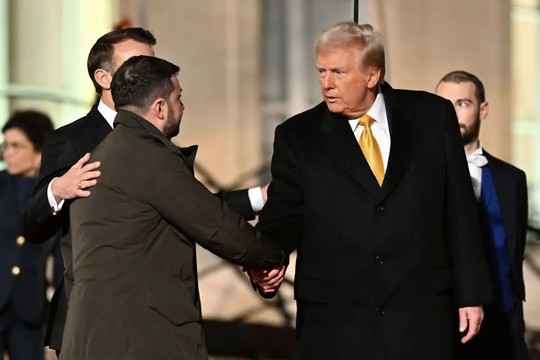Trump and Zelensky in Paris.
Photo: AFP
President Donald Trump reluctantly met with Volodymyr Zelensky and Emanuel Macron in Paris to discuss the way forward in Ukraine.
While Trump says that he has convinced Zelensky to move ahead with negotiations with Russia, Zelensky is already wiggling on any commitments he may have made. Nor is a negotiation and ceasefire exactly what Macron wants either, writes Stephen Bryen, a former US Deputy Under Secretary of Defense.
Zelensky says discussions with U.S. President-elect Donald Trump are premature, as Trump does not have the authority to address such matters.
“It is difficult to talk to President Trump about this because he is not yet in the White House. By the way, I am going to call President Biden in the near future to raise the issue of Ukraine’s NATO invitation,” Zelensky said.
The Trump plan for Ukraine is straightforward, but full of landmines. In simple terms Trump proposes an immediate ceasefire and negotiations, and expects that Ukraine will cede (some) territory to Russia. So far as can be determined, Trump has not yet talked to Putin.
Once a deal is made on territory, there will be a buffer zone of some sort, and some troops drawn from France, Germany and the UK will act as peacekeepers (which Russia almost certainly will not accept). In some fashion Ukraine will withdraw itself from any consideration for NATO membership, probably for a period of time (anywhere from 5 to 20 years).
To begin with, the Russians are not likely to agree to a ceasefire as long as Ukrainian soldiers are on Russian territory. Putin, therefore, will demand their removal from Kursk. The US/Ukrainian position (prior to Trump) is that Kursk is a bargaining chip, and it would seem the Ukrainians want to trade Kursk for Ukrainian territory held by Russia.
Trump's plan's primary focus is on ending the Ukraine war. It says nothing about many of Russia's stated objectives, although Lavrov went through these in his interview with Tucker Carlson (protecting Russian speakers, denazification, protection of the Russian Orthodox Church in Ukraine, a neutral Ukrainian government, no NATO bases or troops). All of this implies major changes to Ukraine's Constitution and rescinding numerous laws passed by the Verkhovna Rada, Ukraine's parliament, as well as cancelling various Presidential decrees. Putin could demand that these laws and decrees be ended before a ceasefire and negotiations take place on territorial issues and status of forces. Whether he will do so, or not, remains a question.
In NATO circles there is talk of sending Zelensky into exile (London is mentioned) and then holding elections in Ukraine. To do this, the Ukrainian political exiles would need to be able to return to Ukraine and organize, and those in jail or under house arrest likewise would need to gain their political freedom.
The stumbling block is the Ukrainian secret services and their military enforcers. They are the ones (both the "civilian" and military secret services) that have been keeping the current Ukrainian government in power. It is hard to see how free elections could be held in Ukraine without standing down these powerful, quasi-military, police operations who extensively spy on Ukrainian citizens and plot assassinations and bombings at home and in and outside Russia. Beyond elections, it is hard to see how any results are possible in Ukraine without resolving the security services issue.
The Ukrainian GRU, officially the Main Directorate of Intelligence, is tightly tied to the CIA and MI-6 in the UK, and other services in the NATO countries (i.e., BND or Bundesnachrichtendienst in Germany, DGSE or Directorate General for External Security in France, and the Security Service or Agencja Bezpieczeństwa Wewnętrznego in Poland. The sister services of the Ukrainians will try to resist any attempt to eliminate or reduce their authority.
Another serious problem is the role of, and behavior of the nationalist units of the Ukrainian army, such as Azov and a number of others. Included here is the Special Operations Forces (SSO) of Ukraine, which consists of 4,000 spetsnaz specialists. Will these units stand down or obey orders coming from Kiev? The fact of the matter is that the professional and voluntary parts of Ukraine's army could play the role of spoiler and could trigger attempts to seize control of Ukraine's government.
Making matters worse for Trump is the Biden administration, funneling billions in weapons to Ukraine at the 11th hour thereby discouraging negotiations, and also carrying out provocative NATO exercises that directly threaten Russia. The latest is the dispatch of nuclear bombers, AWACS and other aircraft (including some from the allies, including Sweden) flying close to the Russian enclave of Kaliningrad and exercises in the area of the Gulf of Finland and in the region of the Kola peninsula. On top of all this, the combative statements by Secretary of Defense Lloyd Austin, taking pride in throwing sand in the gears of the next administration that wants to slow or halt arms sales to Ukraine, not exacerbate the situation by flooding Ukraine with weapons.
Oddly enough, the recent body blows to Russian prestige in the Middle East will make it more, not less, difficult for Putin to make concessions to Trump.
Can Trump persuade Putin to cooperate?
read more in our Telegram-channel https://t.me/The_International_Affairs

 10:49 12.12.2024 •
10:49 12.12.2024 •























